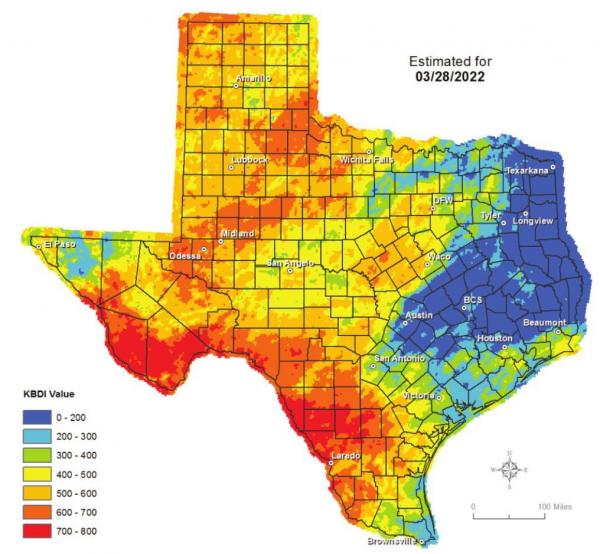Threat of wildfires grows over Hays County
Large areas of land across Texas remain at risk of wildfire, thanks to worsening drought conditions across the state. Currently, over 90% of Hays County is categorized as “abnormally dry,” according to the National Integrated Drought Information System.
Last weekend, wildfires raged in Medina County around 50 miles away. Called the Das Goat Fire, it burned more than 1,000 acres and was considered 70% contained as of the time of press. The Buddy Fire in Blanco County was 100% contained as of March 16. It burned 1,400 acres just 25 miles northwest of the Wimberley Valley.
Temperatures in Hays County have remained at, if not below, the average temperature this time of year over the past 30 days. However, a lack of sustained and heavy precipitation over the winter months has dried out vegetation and soil. This brittle vegetation and dry ground means one thing: fire kindling is in abundance.
In addition to the percentage of the county in abnormally dry conditions, over 66% of Hays County is deemed to be in “moderate drought,” and almost 32% is in “severe drought,’’ according to the NIDIS.
“When the humidity starts dropping and the wind starts blowing, that is when you get the fire danger,” Wimberley Fire Chief Carroll Czichossaid. “This time of year the grass normally dies off, but it is the wind and humidity that fowls everything else up.
The Hays County Commissioners Court reinstated a county-wide burn ban at the beginning of February, joining neighboring counties Blanco, Travis and Caldwell in prohibiting all burning not under special permit from the fire marshal. However, some residents have ignored this ban, according to Fire Chief Scott Collard with the North Hays County Fire Rescue.
“We’ve still seen small fires, bonfires, even with the burn ban,” said Collard. “Even a spark that jumps out of a barbecue pit can be an easy source for a fire. People need to resist the temptation to burn anything right now.”
The local fire department has recently attended to incidents not only caused by small fires but also those caused by hot works such as welding.
“If you’re going to be working with higher temperatures, you need to be paying attention to sparks,” Collard instructed. “It can help to have a second person there for a second set of eyes, and I recommend keeping water on hand [in case a spark catches].”
The Keetch-Byram Drought Index, an index used to determine forest fire potential, balances a drought factor with precipitation and soil moisture. The index ranges from 0 to 800, where 0 represents no moisture depletion and 800 represents absolutely dry conditions. Currently, Hays County sits between 200 and 300 KBDI, according to the Texas Weather Connection.
“The danger of a catastrophic event is still here,” Collard said. “Drought conditions create fire hazards — that’s just how it is. The threat is real, and resources across the state are stretched thin.”
Earlier this month, Texas Governor Greg Abbott issued a disaster declaration for 11 Texas counties in response to wildfire activity throughout several communities. He also directed the Texas Department of Emergency Management to activate the State Emergency Operations Center and increase resources to respond to elevated and critical risks for wildfires in Texas, including central and southern sectors, according to a statement.
Despite the recent flood and tornado event, Collard said he does not see the storm making much difference.
“It’s going to take a significant amount of rain over an extended period of time to bring conditions back to normal fire behavior and potential,” he concluded.


